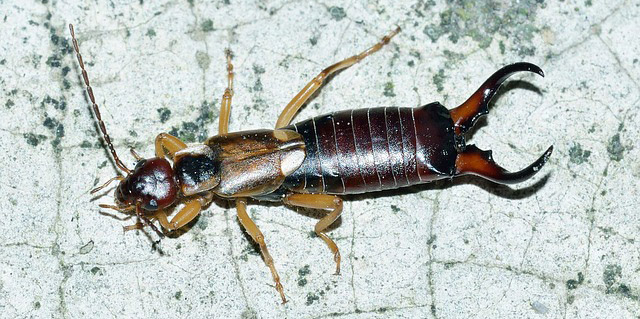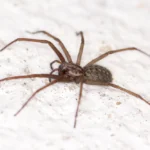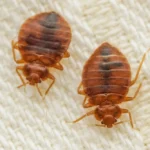
Earwigs are a common pest found in homes and gardens throughout the Pacific Northwest. While not a native species, they travel easily through products and materials that are shipped from other areas. The name conjures up unpleasant images of small insects that enter your ears or other areas of the body, biting and feeding as they build their nests. The fact is that earwigs are not much of a threat to humans. If you do find them in your home or they become a nuisance in your garden, Pointe Pest Control can help you to safely and effectively eliminate them.
Common Myths About Earwigs and Earwig Bites
Over the years, earwigs have earned a reputation through horror movies and myths. Portrayed as tiny pests that can crawl into your ears, they have been rumored to create nests within the ear canal, populating in number and eventually burrowing into and feeding on the brains of their host.
Fortunately, this urban legend does not have even a grain of truth. The fact is that earwigs do not bite at all and rarely bother humans. They do have long and intimidating pincers on their lower abdomen, which are typically used for catching prey. Earwigs can use these pincers to scratch the surface of your skin when they are provoked, but they will rarely draw blood or leave more than a red mark. If you get pinched by an earwig at some point, Healthline advises using an antibacterial ointment to keep it from getting infected.
Where Earwigs Typically Live
Earwigs have wings but typically do not use them and are not classified as a flying insect. The most likely place for them to be found is in outside areas. Earwigs typically live in the soil, in gardens and under rocks surrounding your home and in your landscaping. They can be a pest in that they will chew through the leaves of flowers and vegetables you may be growing. You can help prevent earwigs from infesting your yard by following a few simple tips:
- Avoid using decorative stones in your garden, which provide shelter for earwigs;
- Keep mulch away from your home and spread it thinly;
- Rake up yard debris and leaves as quickly as possible and keep any piles away from your home, garage, or other structures;
- Avoid planting gardens or shrubbery near your home’s foundation and trim any bushes that get too close to windows or doors.
There are some do-it-yourself tips for getting rid of earwigs in your garden, such as burying an empty tuna can filled with vegetable oil in shallow dirt. The theory is that earwigs are attracted to the oil and will fall in, eventually drowning. However, the problem with this and other do-it-yourself methods is that you could easily end up attracting ants, cockroaches, and other types of pests.
Are You Finding Earwigs in Your Home?
While earwigs are most commonly found outdoors, they can end up infesting the inside of your home. They are drawn to damp, dark areas and are small enough to get in through cracks in your foundation or through gaps in your siding. They can also hitchhike their way in through the products you buy and through packages that are delivered. Among the most common types of materials earwigs are attracted to include:
- Piles of newspapers, old mail, or other documents;
- In cardboard boxes and containers;
- In old books and magazines;
- In stacks of old photos and family albums.
When these types of items are kept in your basement or in crawl spaces, it is an open invitation to earwigs. If you need to store this type of items in these areas, make sure they are tightly sealed and use plastic bins instead of cardboard boxes. If an infestation does occur, understand that when moving and unpacking cardboard boxes or other paper items is one of the most likely situations in which you will get pinched.
Earwigs can often be found in the kitchen, too. This is another common location for an earwig pinch to occur. These pests are attracted to food and crumbs left out on counters or laying on the floor, particularly anything oily in nature.
Contact Pointe Pest Control for a Free Consultation
While earwigs do not bite, they can ruin your garden and make you uncomfortable in your home. If you suspect an infestation, our pest control professionals will be happy to conduct a free consultation. Call one of our local offices or contact Pointe Pest Control online and schedule yours today.








